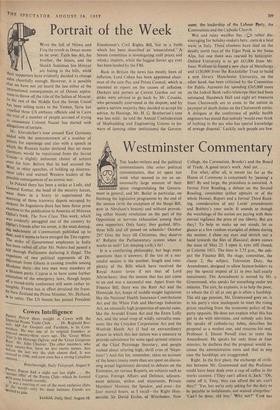Portrait of the Week
WITH the fall of Nizwa and Firq the revolt in Oman seems to be over. Talib bin Ali, his brother, the Imam, and the Sheikh Suleiman bin Himyar are hiding in the hills, while their supporters have evidently decided to change sides cheerfully enough. However, it is possible that we have not yet heard the last either of the international consequences or of Omani aspira- tions to throw off the rUle of the Sultan of M uscat. .lo the rest of the Middle East the Soviet Union has been selling tanks to the Yemen, Syria has expelled three US embassy officials and in Cairo the trial of a number of people accused of trying to assassinate Colonel Nasser has started with allegations of torture.
r. Khrushchev's tour around East Germany ended with the announcement of a number of arrests for espionage and also with a speech in which the Russian leader declared that no more Germans would be repatriated from the Soviet Union—a slightly indiscreet choice of subject even for him. Before that he had accused the West, in other speeches, of holding up disarma- ment talks and warned Western leaders of the Possible consequences of an atomic war.
In Poland there has been a strike at Lodz, and General Komar, the head of the security forces, went there in a hurry to superintend the storming of three tramway depots occupied by strikers. In Jugoslavia there has been fierce press reaction to the publication in America of Milovan Djilas's book, The New Class. This work, which Was evidently smuggled out of the country by Ditlas's friends after his arrest, is the most damag- ing indictment of Communism published up to. date, and it seems to have enraged the Tito regime. The strike of Government employees in India has been called off after Mr. Nehru had passed a bill through Parliament declaring it illegal. The expulsion, of two political opponents of Dr. 1%1..,krtimah from Ghana is causing trouble among Moslems there—the two men were members of a Moslem party. Cyprus is to have some further relaxation of the emergency laws, though hopes of a round-table conference still seem rather in- tangible. France has in effect devalued the franc. In New Zealand the Prime Minister, Mr. Holland, is to retire. The US Senate has passed President
Eisenhower's Civil Rights Bill, but in a form which has been described as 'emasculated.' A Senate committee is investigating steel prices and whisky imports, while the biggest Soviet spy ever has been landed by the FBI.
Back in Britain the news has mostly been of inflation. Lord Cohen has been appointed .chair- man of the new Pay and Prices Council, which is intended to report on the causes of inflation. Dockers and porters at Covent Garden out on strike were advised to go back by Mr. Cousins, who personally intervened in the dispute; and by quite a narrow majority they decided to accept his advice. At Hastings, Mr. H. G. Brotherton's tone was less mild : he told the Annual Confederation of Shipbuilding, and Engineering Unions to be- ware of (among other institutions) the Govern-
meat, the leadership of the Labour Party, the Communists and the Catholic Church.
Wet and rainy weather has rather dis- couraging for holiday-makers here; mere is a heat wave in Italy. Three climbers have died on the deadly north face of the Eiger Peak in the Swiss Alps, but one More was rescued by helicopter. Oxford University is to get £65,000 from Mr. Isaac Wolfson to found a new chair of Metallurgy and £150,000 from the Rockefeller Trust to build a new library. Manchester University, on the other hand, .has been criticised by the Committee for Public Accounts for spending £365,000 more on the Jodrell Bank radio-teleacope than had been estimated. Hardwick Hall and eight art treasures from Chatsworth are to come to the nation in payment of death duties on the Chatsworth estate. A delegate at the conference of public health engineers has stated that nobody 'would ever think of bathing in the sea who has special knowledge of sewage disposal.' Luckily such people are few.






























 Previous page
Previous page